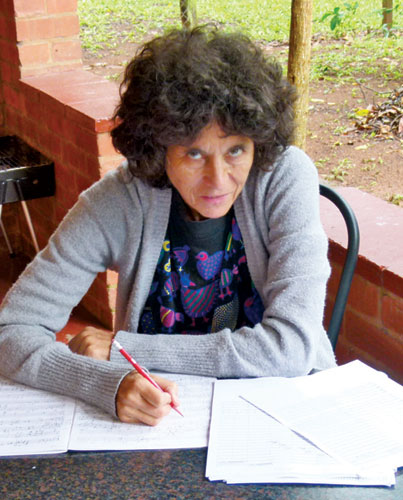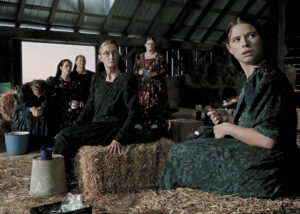“I never had a question. There was never an alternative. I kind of envied the people who had to figure out what they had to do in their careers and lives. Me, it was clear as a bolt of lightning. It was the one thing I knew I had to follow and I was passionate about music. I remember my first passions since before I knew how to explain them, before I went to school.”
Carol Ann Weaver is passionate still, teaching, studying, composing and performing as associate professor of music at Conrad Grebel University College, Waterloo, Ont.
Growing up in Harrisonburg, Va., Weaver began studying piano at age seven. Soon she was writing music and pro-ducing musical shows at school. Winning a piano competition as a first-year student at Eastern Mennonite University (EMU), Lancaster, Pa., suggested to her that she needed to go where she would be more challenged.
At Indiana University, Bloomington, perhaps the largest and best music school in world, according to Weaver, she went to learn, saying, “I never thought I’d win a competition there. . . . There were huge opportunities,” she says, noting that in a class on Baroque music there was a live orchestra of students playing, instead of music on tape. She completed her bachelor’s and master’s degrees there.
Weaver taught at EMU for four years, and another four years at Mennonite Brethren Bible College (now part of Canadian Mennonite University), Winnipeg, Man., before returning to Bloomington to complete a doctorate.
She has been teaching music at Grebel since 1985.
Although she has a classical music background, Weaver infuses her compositions with different rhythmic combinations and textures. In the last 10 years, she has been working at music that is “accessible,” rather than just “abstract,” which requires a “learned elite” to understand it, she says. She finds it relatively easy to write abstract music, but accessible compositions are more difficult.
Music, she says, “needs to make a difference, speak to people.” It is “ulti-
mately a communication,” rather than “just [to] make yourself happy.” This attitude is influenced by being a performer, she believes.
“What lasts is what touches people,” Weaver says, listing architecture, art, music and writing as examples. “I want to be true to that myself.”
She has moved into world music for her compositions and performance, especially African, where music is often not thought of as a singular form of expression. “Some languages don’t have a word for music discrete from dance, event, performance,” she notes. “Like in jazz, pop [and] traditional African music, people begin moving to the beat; each song its own rhythm.”
While on sabbatical earlier this year, Weaver spent time in the Kgalagadi (formerly “Kalahari”) Transfrontier Park, in western South Africa, her “favourite place in the world.” The “desert,” she says, “began calling to me in oboes, pizzicato strings, frolicking bassoons, and horns. . . . Melodies would occur to me, which seemed to rise up from the very soil. . . . An orchestra piece was being born.”
She was told that if she could finish the composition in three weeks, it could be given a “reading”—a rehearsal-like performance—by the KwaZulu Natal Philharmonic Orchestra. She did, and says the piece was “incredibly well received by the players, the conductor [David Plylar] and the people who had come to listen.”
The piece, Kgalagadi Calls, “follows a typical day in the desert, beginning with the gradual rising of the sun and calling of the early morning birds,” Weaver explains. Later, the Cape turtle doves, transcribed as accurately as possible by Weaver, create a major portion of the music.
“The grief of the mother wildebeest who loses her new-born calf is expressed by a solo oboe, while the precise, careful, brilliant stalking of cheetah brothers Dozy and Leadboy is played by twin bassoons,” she says.
And as night settles in, the calming chorus of barking geckos—vaguely resembling the mesmerizing sound of crickets—fills the soundscape, presented by pizzicato strings.
“This desert is never entirely quiet, yet its stillness resonates throughout the piece,” Weaver says.
Back in Canada, Weaver is working at a recording of her composition Paraguay Primeval, while looking forward to a potential Sounds in the Land III conference in 2013. “I see life as ever changing and not a fixture,” she says. “The music can be trusted, the disappointments and challenges of life can be accepted as teaching tools in one’s life.”








Leave a Reply
You must be logged in to post a comment.